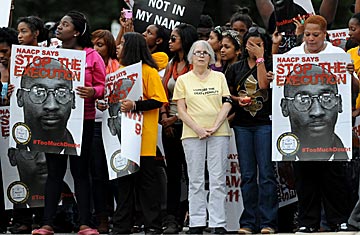
Demonstrators protest the scheduled execution of Troy Davis at the Georgia Diagnostic and Classification Prison in Jackson, Ga., on Sept. 21, 2011
(2 of 2)
But even if you could find a common definition of closure as a sort of healing in the grief process, Bandes says it's unclear that the courts are even the right venue in which to pursue that healing. "It can be very dangerous for the families," she says. "Once you have legislators and judges telling you that there's such thing as closure, then you might believe in it, and then begin to expect that it will happen."
"We saw that with the [Timothy] McVeigh case, where there were families at the execution, hoping it would do something for them, that they would be able to read something on his face," she says. "It didn't happen for some of them. It's like a double victimization."
Here is what McPhail told me when I asked her what Davis' execution would do for her: "I hope that tonight I can close the book, wake up tomorrow with a little peace, and just live out the rest of my life."
So is her belief that an execution will heal her the product of a banal mind? Is she just regurgitating the prosecutor's arguments? I asked Bandes. "No, no. I would never, ever judge someone else's feelings," she says. "I'm not going to say that an execution doesn't solve something for someone." The problem, says Bandes, is that we just don't know. No legal study has been able to measure the satisfaction derived from executions, and yet the assumption that executions lead to closure is driving policy more than ever.
Which brings us to the problem of what Schroeder calls the "extremely individualized context" of victims and the death penalty. Kate Lowenstein, whose father was murdered when she was 9, is the program director for a nonprofit called Murder Victims for Human Rights. She advocates on behalf of families that oppose the death penalty in their loved ones' murder cases. She says plenty of victims feel that way. Often they just don't want to see any more death. Sometimes in child-murder cases, the parents of the victims — she cited an example in Port Charles, La., not exactly a hotbed of liberal sentiment — don't want even a murderous pedophile strapped to a gurney and killed in the name of their innocent children.
The problem, Lowenstein says, is that families aren't allowed to feel that way. "We don't want to be seen as 'bad victims,' " she says. "But it's almost like if you really loved the person who was killed, you should seek the death penalty." Reality is far more complicated, she says: you feel rage toward the murderer but still don't want him executed. The expectations are even tougher for men, she says. They are supposed to seek vengeance.
Those expectations were there for Ross Byrd. At the same time that the world stood vigil for Troy Davis, one of the white supremacists who killed Byrd's father in a horrific 1998 lynching was executed with little fanfare in Texas. But Byrd did not want this execution. "You can't fight murder with murder," he told Reuters. "Life in prison would have been fine. I know he can't hurt my daddy anymore. I wish the state would take in mind that this isn't what we want."
There is, by the way, nuance even in McPhail's position. She didn't go to witness the execution in person. "I wouldn't get any satisfaction from that, no," she says. "My kids, my grandkids are going. But I'm not going in."
She did, of course, want the death penalty to be carried out. She says she "could have lived with life without parole" for Davis, but the jury gave him death, and after 20 years of evasive legal maneuvers by the defense, she thought it was time for the sentence to be carried out.
But here's the thing: the state doesn't really care what she thinks. It was the U.S. Supreme Court, not the McPhail family, that delayed and then approved the execution on Wednesday night. And if she was against the death penalty, like her partner in grief Ross Byrd, the state would still have executed Davis.
So perhaps you are upset that Troy Davis died on Wednesday. Many people are. I also don't think this should have happened. But don't call Anneliese McPhail on the phone. Keep her name off your lips. No matter how many press conferences she gives, no matter how much she grasps for closure, you can be assured that Georgia's prosecutors and politicians wanted this execution even more than she did.
